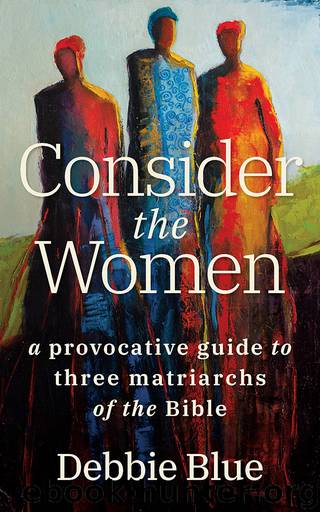Consider the Women by Debbie Blue

Author:Debbie Blue
Language: eng
Format: epub
Publisher: Wm. B. Eerdmans Publishing Co.
9Shoah
Scapegoating and Status-Seeking
Teach your tongue to say, “I don’t know,” lest you be exposed as a liar.
—The Talmud
I was born when all I once
feared—I could
love.
—Rab’ia al Basr
In the Hebrew Scripture, the people of God are enslaved, oppressed by one empire after another, and persecuted when they refuse to accommodate to the empire’s ways. Daniel is thrown in the lion’s den for his refusal to assimilate. “He was there for six days,” we read in the Apocrypha. “There were seven lions in the den and every day they had been given two human bodies and two sheep, but now they were given nothing, so that they would devour Daniel.”
In the stories of the Maccabees, Antiochus, the ruler of the Seleucid Empire, defiles the Jewish sanctuaries, makes the possession of Torah a capital offense, bans Sabbaths, religious feasts, and circumcision. The Jewish people are made vassals of Rome and, again, when they will not accommodate to the empire, their sanctuaries are destroyed, their people killed, forced into slavery, or compelled to flee from their homes.
The story of the Jewish people in Scripture is a story of a displaced people who long for a home where they might finally be safe. The tension is a historical tragedy, but in Scripture it is also an existential plight. One of the important things that becomes clear in midrashic literature is that to be the people of God is in some sense to be unsettled. The history of the people of God is torturous and joyous—it is not easy or simple. Faith is not a set of answers you can write down on a sheet of paper—to be the people of God is to struggle.
At the ritual Passover Seder meal, the youngest child in a family is obliged to ask four traditional questions, which represent four attitudes toward the narratives of redemption, according to Avivah Zornberg. The attitudes are those of the wise son, who knows the question and asks it; the wicked son, who knows the question but refuses to ask it; the simple son, who knows the question but is indifferent to it; and the ignorant son, who doesn’t know the question so can’t ask it. So the Jewish child’s first expression of faith, according to Zornberg, is not a statement of belief, but the first genuinely expressed question. According to the midrashic sensibilities, questions propel the narratives of faith to keep having meaning for the generations.
The Christian tradition has often been more oriented toward answers. It is not uncommon to hear Christians say, “Jesus is the answer.” But like the Jewish rabbis, Jesus asks more questions than he answers. “Who do you say that I am?” “What is it you want?” “Why are you so afraid?” “Why do you look at the speck of sawdust in your brother’s eye and pay no attention to your own?” On the cross Jesus cries, “My God, My God, why have you forsaken me?”
Unlike most narratives of nations we encounter in history, the Jewish narratives in the Hebrew Bible are self-critical.
Download
This site does not store any files on its server. We only index and link to content provided by other sites. Please contact the content providers to delete copyright contents if any and email us, we'll remove relevant links or contents immediately.
The Five People You Meet in Heaven by Mitch Albom(3562)
The Secret Power of Speaking God's Word by Joyce Meyer(3184)
Real Sex by Lauren F. Winner(3016)
Name Book, The: Over 10,000 Names--Their Meanings, Origins, and Spiritual Significance by Astoria Dorothy(2983)
The Holy Spirit by Billy Graham(2944)
0041152001443424520 .pdf by Unknown(2843)
How The Mind Works by Steven Pinker(2813)
ESV Study Bible by Crossway(2774)
Ancient Worlds by Michael Scott(2682)
Churchill by Paul Johnson(2578)
The Meaning of the Library by unknow(2565)
The ESV Study Bible by Crossway Bibles(2550)
The Gnostic Gospels by Pagels Elaine(2527)
MOSES THE EGYPTIAN by Jan Assmann(2412)
Jesus by Paul Johnson(2352)
City of Stairs by Robert Jackson Bennett(2348)
The Complete Dead Sea Scrolls in English (7th Edition) (Penguin Classics) by Geza Vermes(2277)
The Nativity by Geza Vermes(2227)
Ancient Near Eastern Thought and the Old Testament by John H. Walton(2224)
